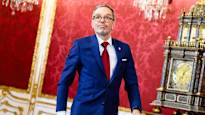Herbert Kickli’s pro-Russia support and espionage accusations linked to his party are causing concern. Austria can also strengthen the pro-Russia bloc within the EU.
The far-right freedom party FPÖ, which won the parliamentary elections in Austria, has risen to the position of government negotiator when the government negotiations led by the conservative party collapsed.
This means that Austria may soon be led by a Hungarian prime minister Viktor Orbán an open admirer and considered pro-Russian Herbert Kickl.
– The success of the FPÖ in the government negotiations can be considered fairly certain, says an Austrian politics professor to STT Reinhard Heinisch from the University of Salzburg.
Kickl and his party have been critical of sanctions against Russia and military support for Ukraine. When the FPÖ was last in government, the foreign minister belonging to the party Karin Kneissl invited the President of Russia Vladimir Putin in 2018 for their wedding.
It is the first time that the FPÖ, founded by former Nazis, is leading government negotiations in the country, although it has been part of the Austrian government several times since 2000.
Can strengthen the pro-Russia bloc
Kickli’s ascension to the chancellor position may indeed strengthen the pro-Russian bloc of Hungary and Slovakia within the EU. These countries have been critical of, for example, supporting Ukraine and sanctions against Russia.
However, Professor Heinisch says that Kickl will not necessarily be the subject of opposition at the first EU meetings, because the Austrian federal president has stated that he will only appoint a government that is sympathetic to the EU.
Kickl has great desires to finally become chancellor and he does not risk it easily.
– But Kickl can change his positions when he feels his position is stable enough, says Heinisch.
In such a case, he could become an Orbán-like figure of resistance in EU meetings.
In previous cases, other EU countries have been able to persuade Orbán to the majority position. However, the situation may change if Orbán is no longer alone in his views.
However, unlike Orbán, Kickl does not hold power alone.
– A lot depends on who, for example, leads the Ministry of Foreign Affairs and EU politics. If the foreign minister comes from the conservative party, it will also curb Kickli’s activities, says Heinisch.
This is because in Austria – unlike, say, its neighboring country Germany – the chancellor does not have the right to tell the minister how he should act in his field. Ministers have a lot of independence.
